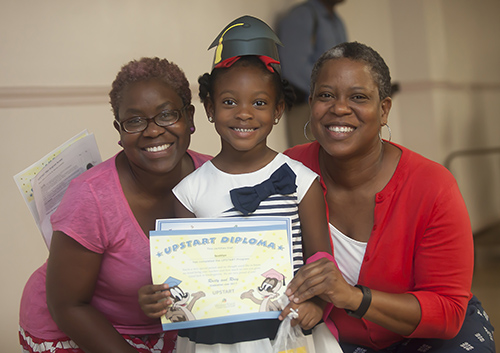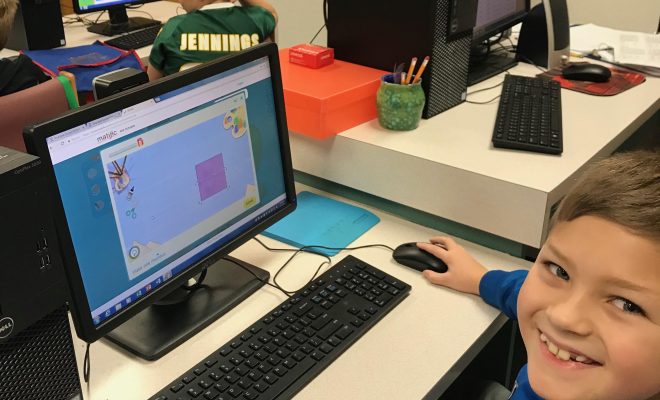How Effective Screen Time Tears Down Barriers to Early Learning

For many of the country’s most vulnerable kids, a blended approach including 15 minutes of online learning a day is the key to success in kindergarten and beyond.
By Benjamin Heuston, PhD
One of the concerns that I hear about the most in early childhood education is around young children and screen time. You can often tell someone’s stripes by the way he or she frames the issue: it’s a no-brainer when phrases like “being exposed to a screen” or “leveraging technology” are used. If you’re ever bored at an early education conference, you can always bring it up and watch the ensuing fray. Not since the reading wars has there been such a broad hot-button issue in early education, and it doesn’t show any signs of slowing down.
At the risk of being burned in effigy, it’s worth trying to bring some common sense and rationality to this endless debate. After working for almost a quarter-century at the intersection of technology and education with researchers, policymakers, parents, teachers, and children, I think it’s safe to say that there are some things that we know—and quite a few more that we can reasonably surmise—from which we can chart a practical path forward.
Focus First on the Child
Let’s start (as I believe we always should) with the child. There is no debate around the fact that children are natural learners. No matter where a child is—inside, outside, standing on her head—that child is sponging up everything that’s around her. We don’t need to worry about “enticing” a child to learn. That’s already built in. Likewise, there is little to no debate around the fact that young children do not just learn in “formal” ways but much more often through what is loosely termed “play,” whether that’s with a friend (real or imaginary), or going for a walk, or digging in the dirt. All of these things are widely accepted and agreed-upon.
But children do not just learn through hands-on experiences; they (like adults) are visual learners as well. Starting from birth, where the focal length of a newborn is from the breast to the face of the mother, children learn by observing visual cues. In the same way that adults might benefit from a video showing them how to fix something around the house, young children can learn from watching an educational video, and it’s therefore not surprising to note that teachers have used videos in classrooms for years.
So, if everyone, both inside and outside of education, seems to agree that children can and do learn in a variety of ways, including from screens, what’s all of the fuss about? At the risk of oversimplifying, what appears to be at the heart of this discussion are two main concerns: the amount of time that children spend with screens and the quality of that time.
Quality and Quantity of Screen Time
The American Association of Pediatrics has provided parents with clear, helpful guidelines about how to construct a family media-use plan that addresses both of these issues. For instance, for young children ages two to five, it recommends no longer than one hour per day of digital screen time, and it further stipulates that the content should be high-quality.
In my experience, these guidelines are both practical and powerful. There’s a reason why screens are proliferating in our lives: it’s not just that they’re less expensive, it’s that they’re downright useful, and as they continue to get better with each technological jump, odds are that they’re going to increasingly be woven into our everyday lives. Eventually, screens are going to become, like all mature technology does, transparent in the sense that we’ll stop referring to it on its own and instead focus on what it allows us to accomplish.
How Technology Helps
Take the area of early literacy, for example. It is widely acknowledged that a key component of school success rests on a child learning to read and eventually being able to read to learn. Children who enter school without the proper preliteracy experiences often struggle to keep up with their peers and only rarely are able to catch up. One of the ways that states have sought to proactively address this need is by fostering high-quality preschool centers that support early literacy.
But as anyone in early education will tell you, this is a not a perfect solution. Many families in America do not live anywhere near a center of excellence. In fact, here in Utah we have one school district the size of Rhode Island with 14 four-year-olds and another district that’s larger than Massachusetts with 226. It’s not just impractical to bring these children to one central location, it’s illegal: it’s considered cruel and unusual punishment to keep the kids strapped into car seats that long. Add in other vulnerable populations like refugees, migrant families who cross state lines, and the homeless, and you begin to see that “universal” preschool is a difficult goal at best.
So, Utah decided that, instead of bringing the children to school to learn about literacy, it would find a way to bring literacy into the home. Now in its 10th year, the Waterford UPSTART program has done just that, at no cost, for tens of thousands of families, and the results are turning heads around the country. The idea behind the program is blessedly simple: help parents engage more with their children’s education and help the children master the key preliteracy skills that they need to be confident and competent when they reach school.
From the child’s point of view, the program is a series of games, puzzles, books, songs, and activities that they use for 15 minutes each day, five days a week. The program adapts to each child’s individual needs and is self-pacing, so while the parents are welcome to sit alongside and watch, the software can be run independently by the child.
Promoting Success for Parents and Students
One of the key components of our work is that we support the parents all the way through the program. We reach out to parents on a regular basis and talk with them about how their children are doing. And because it’s a cloud-based program, we’re able to see how much each child is using it on a daily basis, and we actually intervene with parents when we see kids using it too much.
It’s like aspirin: You don’t want to take too much and you don’t want to take too little. Fifteen minutes is well within the age-appropriate range, and it’s an amount of time during which even young children can maintain their focus. That ability to focus is very important for children when they get to school. Children who have never been in a formal learning environment are not generally capable of sitting down and focusing on the tasks that school requires. Learning to focus the mind and to be task-oriented takes a long time and a lot of repetition for a child to learn, and a regular regimen helps foster this critical ability.
Early reading is one of the hardest things that any of us ever do. Children who work with our program 15 minutes a day, five days a week for an entire school year learn to do hard things. They develop a genuine sense of accomplishment, and the benefits are ongoing.
Children who participate in Waterford UPSTART at age four outperform their peers on state literacy assessments in the fourth grade. That’s not necessarily just because they learned the letters better years ago. It’s because their parents are much more engaged with their schooling, and they’re coming into school with a sense of wellbeing. They’re coming in with a sense of accomplishment and a love for learning. That is the birthright we want every child to have: access to an excellent education.
Through this program, we are able to strengthen families and reach every child—even when that means building solar panels and bringing in satellite internet. And we’re not asking parents to learn the arcane differences between phonological and phonemic awareness; the software can take care of that so we free parents up to talk with their child and have those meaningful back-and-forth interactions that build vocabulary and help children learn important social skills.
The Conversation We Need to Have About Managing Screen Time
Where does this leave us when it comes to screen time? First off, we need to recognize that screens for children have the same opportunities and pitfalls that they hold for adults—nothing more, nothing less. Children who use screens in appropriate measure and for high-quality content are not just going to be fine, but arguably could be advantaged in the same way that we all are when we have access to other technological tools. But in the same way that we don’t let children choose what to eat for dinner, or when to go to bed, it’s vital that young children be taught the appropriate use of these tools and given the support they need to ensure that it is only one facet of what should be a rich and varied life.
And that might be part of the problem. What this means is that parents and educators who work with young children now have an additional task before them: the management of screen time. That’s new and uncomfortable and more work than it’s been in the past. But in the same way that we learned to put appropriate guidelines around other technologies like TVs or MP3 players, I’m optimistic that we will be able to move past the current emotional debate and instead focus on helping our children successfully navigate both the challenges and the opportunities of our rapidly changing world.
Benjamin Heuston, PhD, is president and chief executive officer at the nonprofit Waterford.org.







